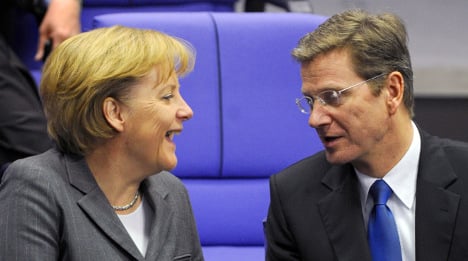Her choice eschews continuing the conservatives loveless alliance with the centre-left Social Democrats. The country’s first priority after the election should be focusing on economic recovery from the global financial crisis, Merkel told the paper.
“Therefore working together with the FDP is the best possibility,” Merkel said, though she admitted that “in domestic and legal policy there have always been differences between the Union and the FDP.”
Economic and political goals for the two parties would be breaking down unwieldy bureaucracy, and reforming corporate, estate and income taxes, the chancellor told the paper. The two parties would also reject setting a sweeping minimum wage and agree on many points in research and energy policy, she said.
Contrary to some expert opinions this week after surprisingly positive economic reports, Merkel warned of too much euphoria.
“The worldwide crisis has not yet passed when we’ve passed through the trough,” she told the paper. “The crisis is over when we are back where we started from.”
Merkel added that the country needed “clear and calculable” political dealings, which would only occur “with a strong union and me as Chancellor.”



 Please whitelist us to continue reading.
Please whitelist us to continue reading.
Member comments